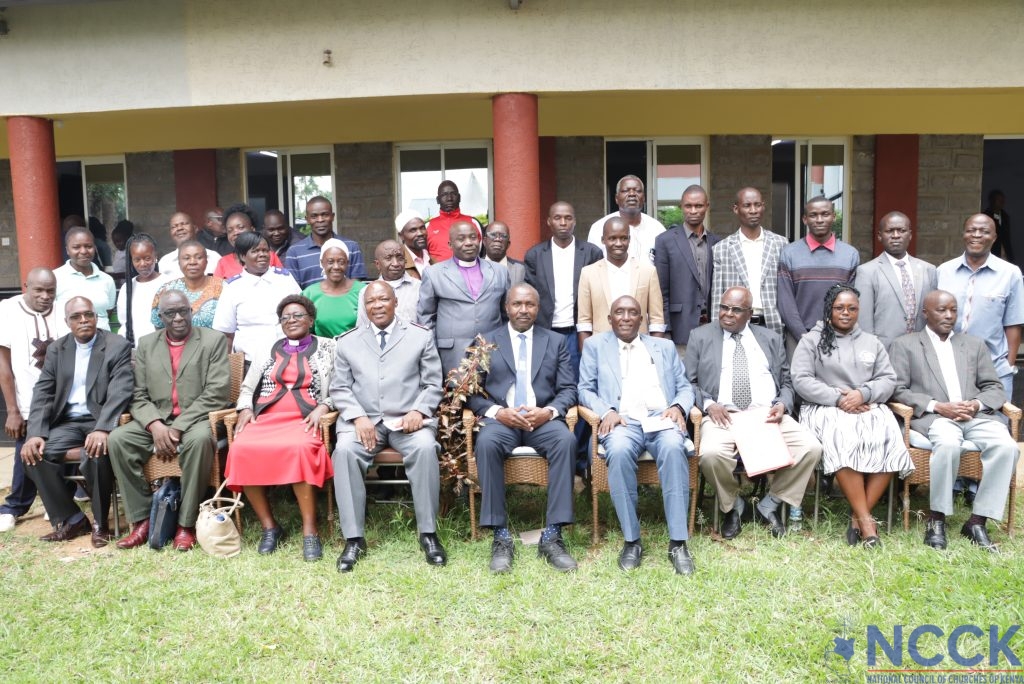Protect and Promote Healthy Living – Western Region
April 2, 2025

Protect and Promote Healthy Living
Press Statement
Preamble
Delegates drawn from the NCCK Western Region have met here at County Green Hotel, Bungoma, for a two-day consultation on the policy framework for healthy lives. The delegates were drawn from Bungoma, Busia, Kakamega and Vihiga counties. They were inspired by the scripture recorded in Genesis 9: 3
Everything that lives and moves will be food for you. Just as I gave you the green plants, I now give you everything.
This scripture reminds us that it is God’s will for every person to have adequate food of the right quality, so that they would have healthy lives. The delegates nonetheless recognized that this has not been achieved, as many Kenyans continue to suffer from nutrition-related illnesses including Non Communicable Diseases. Appreciating the necessity of a policy framework to protect this divine aspiration of healthy lives for all, we now share the following message:
1. Rising Threat of Non Communicable Diseases
Non Communicable Diseases (NCD), which include diabetes, hypertension, cancer, heart disease and other cardiovascular diseases are devastating the nation. Data from the government shows that more than 50% of hospitalizations and 39% of deaths are as a result of Non Communicable Diseases. Families have been shattered and impoverished as they struggle to manage the Non Communicable Diseases, with data showing that a patient spends more than KShs 130,000 per year on medications alone. The National Strategic Plan on Non Communicable Diseases (2022 – 2026) on its part has observed that the prevalence of NCDs has been rising rapidly, and if action is not taken, will grow into a pandemic. It is in this regard that we make the following recommendations:
a) Declare NCDs a National Emergency
We call upon the Cabinet Secretary for Health to declare Non Communicable Diseases a National Emergency to facilitate the convergence of resources and policies on addressing this emerging threat. It will be a major neglect of responsibility if the government allows these preventable conditions to continue growing and destroying lives.
b) Adopt the Nutrient Profile Model
In addition, we appeal to the Ministry of Health to accelerate the engagement with stakeholders to finalize and adopt the evidence-based Nutrient Profile Model. The Nutrient Profile Model is urgently required to set the standards for the nutritional and ingredient compositions of different food groups, and thereby offer benchmarks for enforcement by the Kenya Bureau of Standards and other laws and policies. We assure the Ministry that the NCCK is ready to effectively participate in the process as well as dissemination of the model once it is adopted.
c) Introduce Front of Pack Warning Labels
Notably, the consumption of factory-processed foodstuffs in Kenya is rising exponentially. Recognizing the importance of the purchasers being fully informed of the impact of consuming such foods, we call on the National Assembly to pass a law requiring manufacturers to include Front of Pack Warning Labels. The law will be premised on Article 46(1)(b) of the Constitution of Kenya, which provides that
Consumers have the right – (b) to the information necessary for them to gain full benefit from goods and services.
We must all recognize that technical nutritional content hidden in back-of-the-pack labels is largely ineffective as such labels do not communicate to consumers. Let us have laws that protect the right of citizens to know what they are consuming.
d) Regulate Advertisement of Unhealthy Foods
We call upon the county and national governments to speedily put in place policy measures to regulate advertisement of unhealthy foods that are high in salt, sugar and saturated fats targeted at children. We especially recommend that advertisements for such unhealthy foods should not be placed near schools or other places where children gather, and to not be on media during the watershed hours when children are likely to be consuming media. In addition, the use of children and children-like characters in advertisement of unhealthy foods should be stopped immediately. We must all remember that the Consumer Protection Act Section 12 (1) provides that “It is an unfair practice for a person to make a false, misleading or deceptive representation”. On their part, we call upon media houses to provide incentives to marketers of healthy foods to advertise their products so as to promote healthy living in our nation.
e) Teach Nutrition at all Levels
In addition, we call upon the Ministry of Education, the Kenya Institute of Curriculum Development and partners in the sector to include lessons on healthy eating for healthy living as part of the basic education curriculum. Let us build a culture of healthy diets in the children, while warning them of the risk of being diagnosed with Non Communicable Diseases due to wrong diets. For the parents, the upcoming school holidays will be a good opportunity to teach our children to eat well. On our part, we have committed to use our church structures to educate the out-of-school citizens on the role of healthy diets in countering Non Communicable Diseases.
2. Reform the Taifacare or Revert to NHIF
It is with great sadness that we note the pain and suffering across the country arising from the failure by the Taifacare (formerly called Social Health Insurance Fund (SHIF)), managed by the Social Health Authority (SHA), to cover the medical expenses of subscribers at different levels. The virtual privatisation of healthcare means that the wellbeing of Kenyan citizens has been sacrificed on the altar of unjust financial benefit of a few government officials. The report by the Auditor General that the government does not even control the system that runs the Taifacare is a confirmation that the government abdicated the responsibility of protecting the right provided for in Article 43(1)(a) of the Constitution of Kenya, which states that
Every person has the right — (a) to the highest attainable standard of health, which includes the right to health care services, including reproductive health care;
Recognizing the failure by Taifacare to deliver universal health coverage as promised, we demand that the government urgently reforms the model and benefits provided to match, or be better, than those provided by the defunct National Health Insurance Fund (NHIF). If this is not feasible, then the Taifacare should be scrapped and the nation reverts to NHIF until we are ready to have a people-centered healthcare insurance system.
3. End Early Campaigns and Focus on Serving Kenyans
As has been observed through the years, the biggest hindrance to wellbeing of Kenya as a nation is rampant corruption driven by persistent politicking. It is sad that one day after one election marks the beginning of the campaigns for the next one, though it be five years away. Today, nearly all the elected leaders have stopped delivering on their responsibilities and are instead focused on corruption to amass enough funds to run campaigns in 2027. This is an abominable sin, and such money will be cursed.
We challenge all elected and nominated political leaders to put all their efforts on fighting corruption and delivering on the developmental and existential services Kenyans require.
4. Protect the Altar
Alongside all other Kenyans, we have noted with concern the literal pollution of church sanctuaries by politicians who take advantage of worship services to play politics. It is diabolical for political leaders who are unable to organize public rallies to presume they can ride on the congregations to market themselves. We condemn this trend, and call upon all our fellow clergy to adhere to the guidelines that were issued by the Executive Committee of NCCK, which in part state that:
One, all political leaders who attend worship services are to be treated the same as all other worshippers
Two, all monetary contributions should be treated as offerings and should not be announced or be accompanied by fanfare
Three, religious leaders should avoid endorsing or opposing any political leaders or parties and to instead remain objective and non-partisan
Four, politicians should not be allowed to address the congregants inside the church, and should instead speak to people outside the church building after the service
Let us all demand that anyone who comes to the places of worship brings themselves under the authority of God and submit to the leadership of the presiding clergy.
5. Conclusion
In conclusion, we appeal to all stakeholders to contribute to enactment of policies that protect healthy diets for healthy living, so that we can receive the promise God made in Psalm 132: 15
I will bless her with abundant provisions, her poor I will satisfy with food.
May God bless our nation with healthy food for healthy living.
We wish all people a Blessed and Christ-filled Easter full of reflection on the sacrifice our Lord Jesus Christ made for us on the cross.
Signed on this 28th day of March, 2025, at County Green Hotel, Bungoma.
Presiding Clerk Seth Agala
Chairman, NCCK Western Region























